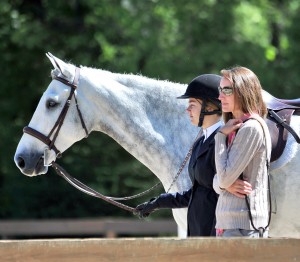08 Apr Children and Riding Lessons
 The benefits of equestrian training are numerous, from physical to mental. If your child has expressed a desire to learn to ride, or if you have equine experience and wish to instill it in your youngster, it is essential to seek out a qualified and trustworthy instructor to introduce an activity that can be enjoyed for a lifetime. Generally trainers will take on students as early as age 5 or 6, but this often depends on the maturity level of the child. Some children may take to it boldly, eager to ride. Others may feel more comfortable spending time being introduced to horses through a a series of horsemanship lessons. An equestrian education requires a measure of dedication that may exceed what those new to the sport may expect. In addition to one or two lessons a week lasting anywhere from half an hour to an hour, there are grooming tasks as well as lessons in how to care for equipment (tack). These aspects of their training, however, reinforce a quality that extends beyond the saddle: responsibility. Whether for sport or pleasure, there are peripheral physical, mental and emotional benefits to horseback riding. Certainly getting children away from the demands of school and the distractions of technology and out of doors are pretty much givens. But riding a horse improves balance and coordination; develops the leg, abdominal, shoulder and back muscles; increases muscle tone, flexibility and fine motor skills; develops core strength; improves posture; and burns calories. Hand in hand with that are the tasks associated with riding: leading a horse, grooming, and cleaning and carrying equipment are all forms of exercise in their own right, further building strength and endurance. Mentally, the benefits of horseback riding include building self-esteem and confidence as well as improving life skills such as decision-making, communication, organization, goal-setting, teamwork and problem solving. Riding is an excellent stress-reliever and is also thought to help memory. The emotional connection a young rider builds with his or her horse cannot be understated. As caretaker to a creature that offers acceptance and companionship, children learn empathy and compassion for another being. As they grow and learn together, they form more than a partnership — they forge a bond that for many could rival any human friendship. There is far more to being on horseback than just sitting in the saddle and going along for the ride. It might look easy, but riding necessitates a respectful relationship between horse and rider that is essential to cooperation between the two. Developing that relationship requires hard work and dedication. If you decide to allow or encourage your child pursue riding instruction, do so knowing that whether they become a competitor or simply ride for the pleasure of it, the benefits they will take away from training are immense, with lessons that last a lifetime.
The benefits of equestrian training are numerous, from physical to mental. If your child has expressed a desire to learn to ride, or if you have equine experience and wish to instill it in your youngster, it is essential to seek out a qualified and trustworthy instructor to introduce an activity that can be enjoyed for a lifetime. Generally trainers will take on students as early as age 5 or 6, but this often depends on the maturity level of the child. Some children may take to it boldly, eager to ride. Others may feel more comfortable spending time being introduced to horses through a a series of horsemanship lessons. An equestrian education requires a measure of dedication that may exceed what those new to the sport may expect. In addition to one or two lessons a week lasting anywhere from half an hour to an hour, there are grooming tasks as well as lessons in how to care for equipment (tack). These aspects of their training, however, reinforce a quality that extends beyond the saddle: responsibility. Whether for sport or pleasure, there are peripheral physical, mental and emotional benefits to horseback riding. Certainly getting children away from the demands of school and the distractions of technology and out of doors are pretty much givens. But riding a horse improves balance and coordination; develops the leg, abdominal, shoulder and back muscles; increases muscle tone, flexibility and fine motor skills; develops core strength; improves posture; and burns calories. Hand in hand with that are the tasks associated with riding: leading a horse, grooming, and cleaning and carrying equipment are all forms of exercise in their own right, further building strength and endurance. Mentally, the benefits of horseback riding include building self-esteem and confidence as well as improving life skills such as decision-making, communication, organization, goal-setting, teamwork and problem solving. Riding is an excellent stress-reliever and is also thought to help memory. The emotional connection a young rider builds with his or her horse cannot be understated. As caretaker to a creature that offers acceptance and companionship, children learn empathy and compassion for another being. As they grow and learn together, they form more than a partnership — they forge a bond that for many could rival any human friendship. There is far more to being on horseback than just sitting in the saddle and going along for the ride. It might look easy, but riding necessitates a respectful relationship between horse and rider that is essential to cooperation between the two. Developing that relationship requires hard work and dedication. If you decide to allow or encourage your child pursue riding instruction, do so knowing that whether they become a competitor or simply ride for the pleasure of it, the benefits they will take away from training are immense, with lessons that last a lifetime.
